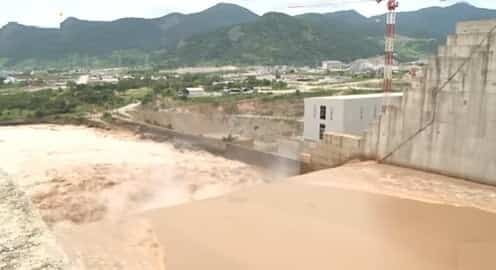 BY TESFA-ALEM TEKLE, 9 JUNE 2013
BY TESFA-ALEM TEKLE, 9 JUNE 2013
Addis Ababa — As tensions between Egypt and Ethiopia rise over a new dam on the Blue Nile, Addis Ababa on Sunday stressed that no force could stop the construction of its massive Grand Ethiopian Renaissance Dam (GERD) being built just 30 kilometers from the border with Sudan.
Concerns have swelled in Egypt after Ethiopia diverted the course of the Nile River last week in a bid to complete the project which is 21% completed.
In a closed door meeting held on Monday, Egyptian politicians from different political parties suggested to President Mohamed Mursi a number of sabotage proposals including military attacks as a means to stop the dam’s construction.
They also suggested Among others, backing Ethiopian rebels as a means to destroy the 4.8 billion dollar project, using Egypt’s intelligence service to destroy the dam as well as spreading rumors that could scare Ethiopia from continuing the project were sabotage plans proposed by Egyptian Politicians.
Following the Egyptian high profile meeting – which Egypt’s State TV accidently aired live – tensions between Cairo and Addis Ababa have further escalated.
In an interview with Sudan Tribune a senior government official on Sunday stated Ethiopia’s firm position over the Nile Dam saying the horn of Africa’s nation won’t negotiate over what he referred it was a “regional project”.
“There is no internal or external force that could stop the dam project” Ethiopia’s foreign ministry spokesperson, Ambassador Dina Mufti, told Sudan Tribune.
The Ethiopian official said the international panel of Experts has proofed that the construction of Ethiopia’s dam will not have any significant harm on downstream countries of Sudan and Egypt and the respective countries particularly Egypt has to accept the final findings.
However Egypt seems to be reluctant to accept the final conclusions and investigation outcomes released by the panel of experts which comprises of six members from Sudan, Egypt and Ethiopia as well as four international experts.
“The final findings indicate that Egypt and Sudan will be benefited from clean energy generated by the plant and will also reduce the accumulation of sedimentation on lower riparian countries” Dina said.
He added that the panel of experts has encouraged Ethiopia to push ahead with the project as it won’t harm Egypt despite its fears.
ETHIOPIA REQUESTS EXPLANATION:
Outraged by the threatening remarks made by Egyptian politicians in connection with Ethiopia’s dam project, the Ethiopian foreign ministry has summoned the Egyptian ambassador in Ethiopia for clarification.
“The Ethiopian government and people are saddened by the shocking and violent remarks of Egyptian politicians” Dina said adding that “Ethiopia will continue to push ahead with building the power plant despite what so ever”.
When asked if Egypt has responded over the hostile remarks, Dina told Sudan Tribune: “We are still waiting. We haven’t yet received any official explanation from the government of Egypt”.
In a statement the Ethiopian government has condemned what it said were irresponsible statements by Egyptian politicians.
“The Ethiopian government chooses to remain patient about these remarks, but the unconstructive propaganda against Ethiopia continued” said the government.
“In any event, Ethiopia will continue to work to forge stronger ties with all friendly countries and neighbors to create a conducive environment in its fight against its greatest enemy, poverty. In that spirit, Ethiopia will continue to cooperate with Egypt.”
WAR OVER THE NILE:
As Ethiopia presses ahead with construction of Nile dam some political analysts have speculated that Egypt and Ethiopia could go to war over their Nile water dispute.
Egypt has long opposed the construction of Africa’s biggest hydroelectric power plant project arguing that it could diminish the rivers water supply to its territory.
The Ethiopian official has declined to comment on whether Ethiopia is ready for any possible confrontation over the resources dispute.
He also refused to comment over the level of Ethiopia’s security to defend any attacks.
According to Global Firepower reports, the country which is Africa’s most populous nation after Nigeria has the second strongest military on the African continent.
Recently an Ethiopian military official alleged to Sudan Tribune that the East African nation has developed a drone (unmanned aerial vehicle); a military technology often associated with the United States.
